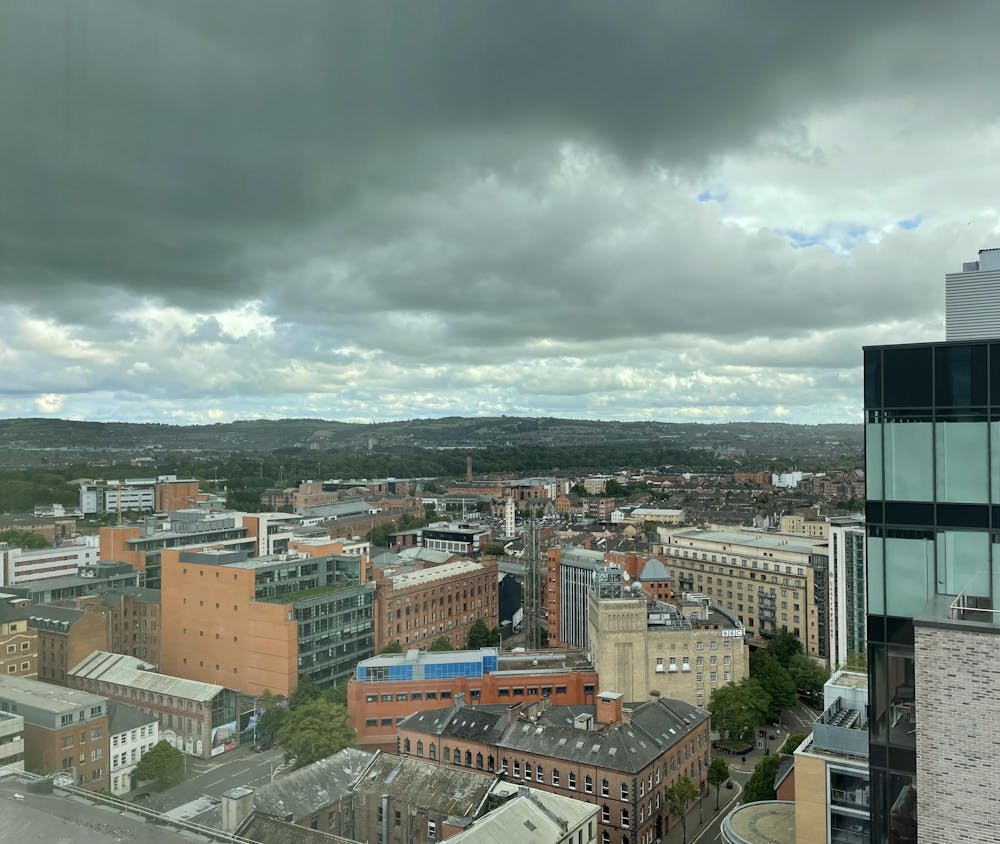For as long as I can remember, the island of Ireland has played a central role in my life.
Having been baptized in Clonakilty, County Cork and having my middle name be named after the Irish general Michael Collins, this is perhaps no surprise. Living in London for the first ten years of my life, I was able to frequently visit my godparents in Cork and grew to love Ireland. Through my classes at Notre Dame and impromptu history lessons from my dad, I gained an understanding of its history and its struggles for freedom.
Despite my name and my love for Ireland, however, I am a citizen of the United Kingdom, and not of Ireland. Having spent ten years in Britain gave me a fondness for that country as well, even if my blood may be Irish. I feel some sense of Britishness along with a sense of Irishness and a sense of Americanness.
These different conceptions of national identity were brought forth for me when I interned at the Irish Department of Foreign Affairs this summer. There, I worked on the government’s Reconciliation Fund, which allocates funding to community organizations in Northern Ireland working to promote peace. Despite my previous travels to Ireland, it was the first time I had spent a prolonged period of time in Ireland and the first time I traveled to Northern Ireland.
With the Department of Foreign Affairs, I was able to travel to Belfast and meet with community leaders working to promote understanding and better relations between different communities. I was able to see the peace walls which separate Catholic and Protestant neighborhoods. I was able to see the Republican and Unionist murals which line the city’s walls. I spoke with politicians and community leaders who had experienced death threats and lived in fear of violence.
In Northern Ireland, conflict between Unionists and Nationalists, between Irish and British, between Catholics and Protestants is not resigned to the past. It is not a page in a history book or an exhibit in a museum. It is the everyday reality of some two million people. It is they who are left to the deal with the complicated and often ugly legacies of both British imperialism and Irish republicanism.
Only in the past twenty years has relative stability been brought to the region. Even still, the underlying issues have not been resolved. A modus vivendi has been achieved, but the region remains a powder keg that could ignite if given the spark.
My time in Northern Ireland this summer brought home the reality for me that the people in Northern Ireland, in both communities, have been forgotten in many ways. To most in Britain, Northern Ireland is a practical and political afterthought, and although polls show that the majority of people in Ireland favor a united Ireland, the Irish government has presented no plan for what a united Ireland might look like.
Whether or not there will be a united Ireland is, and ought to be, up to the people of Northern Ireland themselves. But shifting demographics and an increase in the number of Catholics in Northern Ireland make unification more feasible in the coming decades.
If unification is to be undertaken, serious conversations must be had about what it means to be Irish, what it means to be British and what it means to live in Northern Ireland. The wrongs done by both Unionist and Republican groups must be recognized. This difficult work must be done. Projects such as the Reconciliation Fund are a step in the right direction, but more work must be done. If these conversations are not had and if all voices are not heard and respected, then the not-too-distant tragedy of violence is doomed to repeat itself.
In my own life, competing conceptions of Irishness and Britishness exist and conflict with one another. At times, I feel as though my British citizenship is inconsonant with my love for Ireland, or that my appreciation of British institutions is at odds with the harm done by Britain to Ireland. In the end, though, both identities can exist within me. One does not diminish the other and both form essential parts of my self.
In Northern Ireland, these two conceptions of national identity have conflicted for over 400 years and at great cost. The future of Northern Ireland must make room for these two identities to coexist without being consigned to a slogan or a rigid ideology. It is difficult to reconcile different parts of a self or a nation. It takes care, time and sacrifice, but, in the end, it is the only option.
Liam Kelly is a senior from Westport, Connecticut studying history and political science. He has served as Editor-in-Chief since March. Contact Liam at lkelly8@nd.edu.










